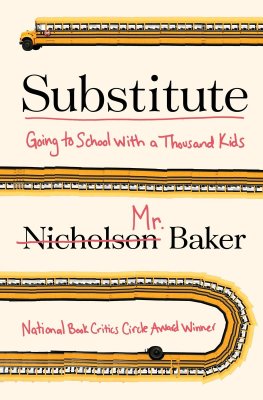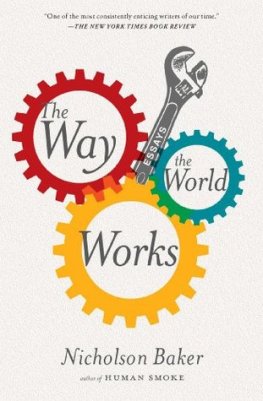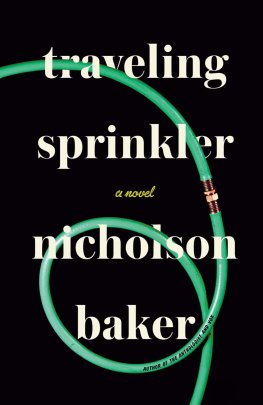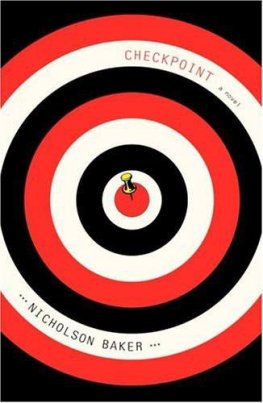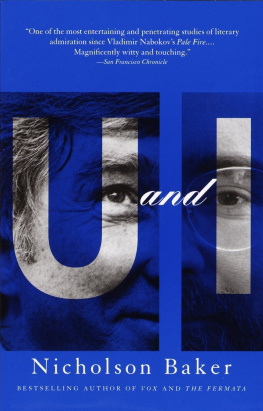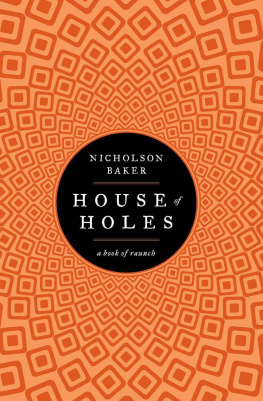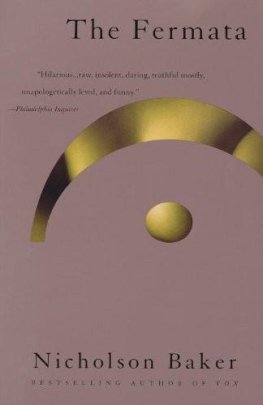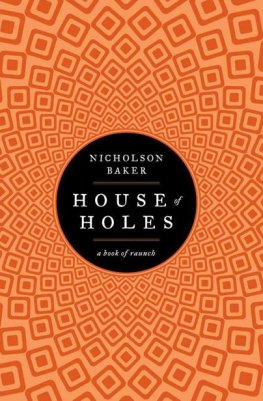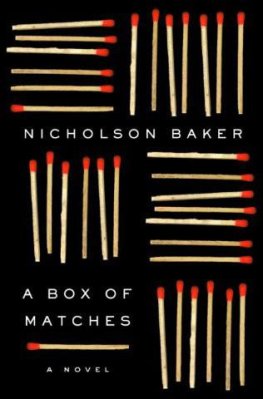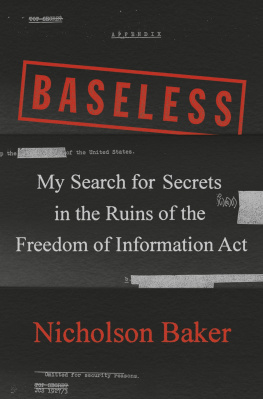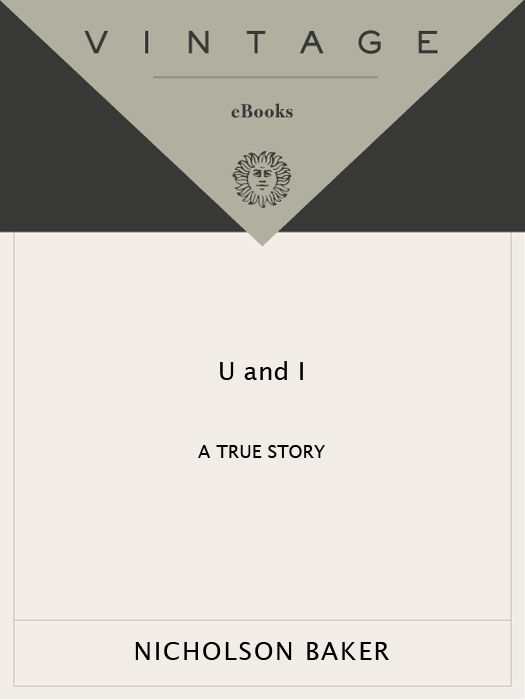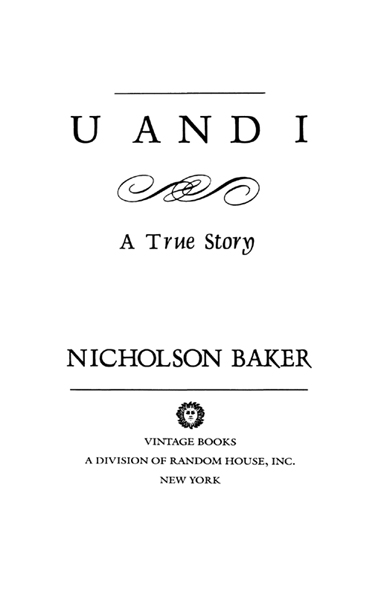Acclaim for Nicholson Bakers

U and I

Nicholson Baker is a first-class writer. He has succeeded in finding a fruitful and idiosyncratic way of describing the quotidian processes of experience.
Philadelphia Inquirer
Hilarious the informal literary criticism of U and I is as effervescent as the prose.
Boston Globe
A brilliant stroke: in his quirkily rambling way Baker has given us an utterly sui generis chronicle of a readers interior life. Its distinctive appeal derives from its celebration of language and the life-giving currents that pass from writer to reader.
Mirabella
Nicholson Baker is one of the most remarkable and one of the oddest talents to have appeared in the past decade.
John Banville
A loopy love letter, a fans notes by the most eccentric and garrulous of fans.
Newsday
The form this book takes is such a sublime invention that its first use must also be its last.
Esquire

Nicholson Baker
U and I
Nicholson Baker was born in 1957 and attended the Eastman School of Music and Haverford College. He has published seven novelsThe Mezzanine (1988), Room Temperature (1990), Vox (1992), The Fermata (1994), The Everlasting Story of Nory (1998), A Box of Matches (2003), and Checkpoint (2004)and three works of non-fiction, U and I (1991), The Size of Thoughts (1996), and Double Fold (2001), which won a National Book Critics Circle Award. In 1999 he founded the American Newspaper Repository, a collection of nineteenth- and twentieth-century newspapers.

Books by Nicholson Baker
THE MEZZANINE
ROOM TEMPERATURE
U AND I
VOX
THE FERMATA
THE SIZE OF THOUGHTS
THE EVERLASTING STORY OF NORY
DOUBLE FOLD
A BOX OF MATCHES
CHECKPOINT
VINTAGE BAKER
VINTAGE BOOKS EDITION, FEBRUARY 1992
Copyright1991 by Nicholson Baker
All rights reserved under International and Pan-American Copyright Conventions. Published in the United States by Vintage Books, a division of Random House, Inc., New York and simultaneously in Canada by Random House of Canada Limited, Toronto. Originally published in hardcover by Random House, Inc., New York, in 1991. A small part of this book was first published in The Atlantic.
Grateful acknowledgment is made to Alfred A. Knopf, Inc., for permission to reprint three lines from Midpoint from Midpoint and Other Poems, by John Updike. Copyright 1969 by John Updike; and four lines from Shipbored from The Carpentered Hen and Other Tame Creatures, by John Updike. Copyright 1982 by John Updike. Reprinted by permission of Alfred A. Knopf, Inc. Excerpts from the works of John Updike reprinted by permission of Alfred A. Knopf, Inc.
Library of Congress Cataloging-in-Publication Data
Baker, Nicholson.
U and I : a true story / Nicholson Baker.1st Vintage Books ed.
p. cm.
Originally published in hardcover by Random House, Inc., New York, in 1991T.p. verso.
eISBN: 978-0-307-80750-2
1. Baker, NicholsonAuthorship. 2. Authors, American20th centuryBiography. 3. Authorship. I. Title. II. Title: You and I.
[PS3552.A4325Z477 1992]
813.54dc20
[B] 91-50486
v3.1

FOR MY MOTHER
Contents
It may be us they wish to meet but its themselves
they want to talk about.
CYRIL CONNOLLY

1

On August 6, 1989, a Sunday, I lay back as usual with my feet up in a reclining aluminum deck chair padded with blood-dotted pillows in my father-in-laws study in Berkeley (we were house-sitting) and arranged my keyboard, resting on an abridged dictionary, on my lap. I began to type the date and the time, 9:46 A.M. I had no idea what subject I was going to cover that morning. A week or so earlier I had finished and sent off a novel, my second, and I was still full of the misleading momentum that, while it makes the completion of novels possible, also generally imparts a disappointingly thin and rushed feeling to their second halves or final thirds, as the writers growing certainty that he is finally a pro, finally getting the hang of it, coincides exactly with that unpleasant fidgety sensation on the readers part that he is locked into a set of characters and surroundings he knows a bit too well by now to enjoy. I wanted very much to keep slapping esemplastically away at the keys, and the imminence of this very pleasure made the words the act of beginning to write in the morning never loses its pleasure appear in the to-be-typed lounge in my awareness; but before I could move my fingers, I recalled that Updike had said something similar in Self-Consciousness: In the morning light one can write breezily, without the slightest acceleration of ones pulse, about what one cannot contemplate in the dark without turning in panic to God. A memorable sentence for me (though I only remembered the first half) not only because it seemed simple and true, but because I had read it twice, first quoted in a book review and then in the book itself. And with this memory of Updike I hesitated; I didnt type what I was going to type; I shifted course.
Donald Barthelme had just died, on July 23. My wife had seen the Associated Press obituary in the newspaper. My sense of being detached from the literary and academic communities, if there are such things, was reinforced by having learned of his death not through some grief-stricken phone call from a close associate or a devoted student of Barthelmes, but merely from the local paper, whose information is available to all. I stared distractedly for half an hour, unsure of what to do, while my wife stood in the middle of the rug with round eyes, saying, Im so sorry, Im so sorry. I decided I should write a letter of condolence to his editor at The New Yorker, but I didnt begin it. Then my daughter got an ear infection. On the first of August she said, Im going to choke, Daddy, I dont want to choke, and I held her awkwardly over the kitchen sink, cupping her forehead in my palm (suddenly remembering, from when my mother had held my own forehead, how this brain-embrace transferred some of the misery of your sickness to a higher power), and I felt her stomach muscles powerfully tighten. I took her to the doctor that day and got her some antibiotics and when we returned I remembered that I owed my great-uncle Dick, who was very ill, a letter. Instead of writing it I made several attempts at the letter to The New Yorker


